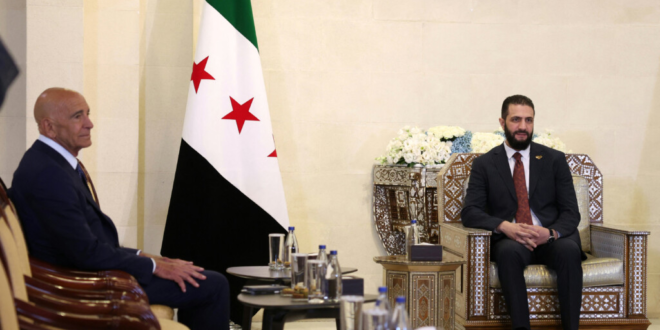“One Syria, One Army, One Government,” declared Damascus following a July 9 meeting between Syrian Interim President Ahmad al-Sharaa, U.S. envoy Tom Barrack, and Mazloum Abdi, the leader of the Kurdish-led Syrian Democratic Forces (SDF). The statement signals a firm rejection of the SDF’s calls for a decentralized and federal system in Syria.
The meeting comes at a time when a March 10 agreement, signed by Sharaa and Abdi, is at risk of collapse because of limited progress and numerous disagreements between the two sides on military integration and equal participation in the political process. Brokered primarily through U.S. mediation, the deal was hailed by both the Syrian government and the SDF as a positive development — a pathway to unifying Syria under a central government and creating a national army. The SDF controls 30 percent of Syria’s territory and continues to cooperate with U.S. forces in the region to combat the Islamic State.
Stalled Implementation of the March Agreement
The March agreement stipulated the integration of all civilian and military structures in northeast Syria into the new Syrian state. It also guaranteed the rights of all Syrians, regardless of their ethnic and religious origins, to participate in the political process. Since then, the SDF and the government in Damascus have created working groups that deal with each of these provisions separately. In April, the SDF withdrew from Kurdish areas in Aleppo and conducted prisoner exchanges with the Syrian government, signaling positive steps toward implementing the accord.
However, the agreement’s implementation has since stalled, primarily due to a significant disagreement over the Syrian constitutional declaration issued by Damascus on March 13. This declaration, effectively an interim constitution, was drafted without consulting the Kurds. Though it claims to establish “a political system based on separation of powers,” the declaration allows Sharaa, in addition to his executive powers, to appoint lawmakers and top judges with no oversight.
Ilham Ahmed, the co-president of the Democratic Autonomous Administration of North and East Syria, the administrative body for the northeast of the country, said in April, “We want to participate in drafting the constitution and managing the country.” She stressed that the constitutional declaration went against the March agreement and called for a decentralized federal system in Syria.
Damascus Rejects Kurdish Demands
A “well-informed source” told Syria TV that the “SDF delegation insisted on adopting a decentralized system that gives it administrative and security authority in northeast Syria and complete local control over these areas.” Sharaa’s delegation rejected this demand, insisting that these areas must be under the control of the central government in Damascus.
According to the same source, the SDF also called on Damascus to allow it to keep “its military structure and join the new Syrian army as an independent force under the name Syrian Democratic Forces,” with its units remaining deployed in the areas it currently controls. Sharaa’s government rejected this demand as well, insisting that the SDF must integrate into the national army as individuals and not as a separate military bloc.
U.S. Should Facilitate Implementation of the March Deal
U.S. envoy Tom Barrack signaled after the meeting that the “SDF must accept that Syria is one country, one army, one people. Federalism will not work here.” At the same time, the Syrian government’s statement indicated that it “warns from delaying any implementation of the signed agreements.”
The United States wants to see the immediate implementation of the March deal because it closes any gaps in governance and security that could be exploited by the Islamic State. Yet the new Syrian leadership has not presented the SDF with any commitment to include the Kurdish community in the Syrian political process. Accordingly, Washington must proceed with a balanced approach that urges Damascus to recognize Kurdish concerns related to the centralization of power under Sharaa, whose authority derives not from a popular mandate, but from the military defeat of Bashar al-Assad’s regime.
 Eurasia Press & News
Eurasia Press & News


